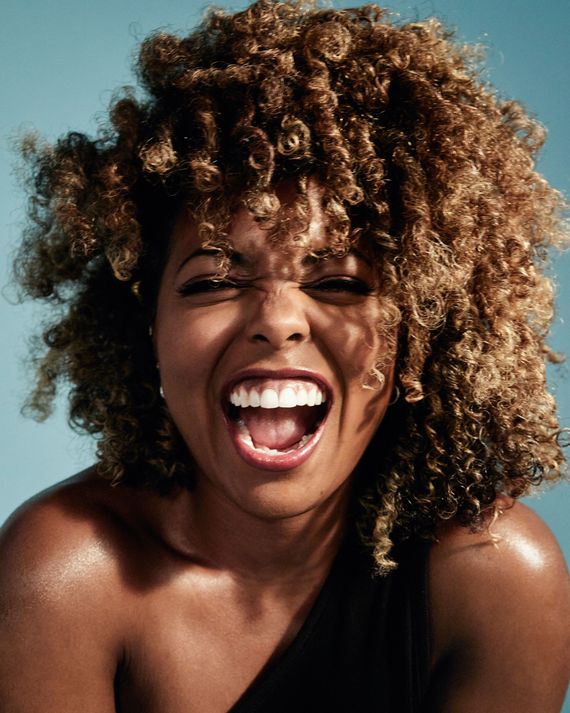
On November 6, 2019, the night before she opened in the starring role of Tina: The Tina Turner Musical, Adrienne Warren developed a herniated disk in her back — though she didn’t know it yet. She just knew she was in pain. Her friends came over to her house and put her into a hot bath, then an ice bath to soothe her muscles. They fed her chicken to get her protein. “I was crying,” she remembers, “because I knew that Tina was there, and Oprah was coming, and all these people were counting on me, and I couldn’t walk.” Her doctor helped, but there wasn’t time for diagnostic tests, so the next day, Warren made it to the theater, barely. Backstage, Daniel J. Watts, who plays Ike Turner, held her upright. Then the curtain rose, and Oprah and Tina and everyone else watched Warren dance and sing on her own. “No one knew” the extent of the injury at the time, she says. “I had to get through.”
When the reviews came in that night, critics were tepid on the musical itself — but described Warren in terms typically reserved for acts of God: She “rocks the rafters,” said the New York Times; at New York, we called her work “gigantic” and “tidal”; The Hollywood Reporter praised her “incandescence.” To shine that brightly, Warren was setting herself on fire, doing six nights a week with actress Nkeki Obi-Melekwe alternating for Wednesday and Saturday matinees, a format reserved for physically punishing roles (your Elphabas, your Evitas, your Evan Hansens). Her go-to during “River Deep — Mountain High” involves hitting and modulating a wail over a key change, producing a sound like a jet engine on a runway. She sustained it for nearly five months, even as she physically fell apart: “I had a lot of injuries that just could not heal themselves because I never had time to sit down.” By early March 2020, she could feel herself accelerating along the rails of what’s typically considered success in theater. Tony season was in April and May, and people were predicting a win. “It was the moment you wait for forever,” she says. “And then the track just disappeared.”
At first, the shutdown was a relief: She could rest and heal. Then she began to mourn the loss of the show and the seeming end to a chapter of her career. And then, as protests over the police killings of George Floyd and Breonna Taylor received muted responses from Broadway institutions, Warren’s grief gave way to something else. She had channeled all this work into a so-called theater community, and it could barely eke out statements in support of Black lives. She considered, and publicly spoke about, quitting the stage.
Yet on October 8, Warren will play Tina Turner again — this time on her terms. “We’ve been doing this work to come back better, and I felt like I had been doing so much work, for so long, that if Broadway came back and I wasn’t there, I would have regretted it,” she says.
When we meet for dinner in late July, she has returned to the gym to prepare. She’s adamant that she will be heard as the production makes decisions about safety. She has brought up the idea of making unsold seats available to New Yorkers in need. And she has already drawn one firm boundary: Tina has announced that Warren will return to star only for a “limited engagement” for an unspecified time. When I ask if that means months or weeks, she pauses to consider. “Can I say?” she muses. “I think it may be weeks.”
Warren grew up in Virginia, singing at church and playing basketball, and her roles have drawn on her athleticism. She played a cheerleader analogous to Gabrielle Union’s film character in the 2012 musical of Bring It On and tap-danced to a Tony nomination in the 2016 metarevival of Shuffle Along. Then she was absorbed into Tina: a workshop in 2016, a London run in 2018, a Broadway debut in 2019, and now, in 2021, Broadway again. (“If the world stops again … I’M RETIRING,” she tweeted recently.) Her workouts for the role involve cardio and boxing; the latter helps with the stage combat she performs when reenacting Ike’s violence against Tina. When discussing the physicality of the role, she mentions athletes who have publicly put their mental health before their jobs, like Naomi Osaka and Simone Biles. “What happens to them is on a completely different scale, but I relate to that,” she says. “Just pushing, pushing, pushing — it’s something as Black women we’re conditioned to do from the moment we’re born.”
Warren well knows how easily her industry avoids listening to Black performers. Shuffle Along showcased a top-tier cast of Black talent, including Audra McDonald, Brian Stokes Mitchell, and Billy Porter, and although it got buried under Hamilton at the Tonys, ticket sales seemed healthy. Then, after McDonald announced her pregnancy and plans were made to recast her role, producer Scott Rudin abruptly closed the show in June 2016. “We were so confused and angry and felt like we were silenced,” Warren says. The show itself was about Black performers being taken advantage of and forgotten, and, well, there you go. That summer, following the deaths of Philando Castile and Alton Sterling, she saw conspicuous silence in the theater world: “It was like they couldn’t say the words Black lives, before you even add on matter,” she says. “It was like they didn’t see us. We didn’t understand that in a year when Hamilton was being celebrated — a story that’s not a Black narrative but about white men, being told by people of color.”
To confront that silence, Warren launched the Broadway Advocacy Coalition with her Shuffle Along castmates Amber Iman, Britton Smith, and Christian Dante White, plus Jackie Bell and Cameron J. Ross. Their initial goals were to turn outward — by finding ways for artists to engage in criminal-justice reform — and inward to raise awareness of racism in their industry. She stepped away as Tina took off, but when everything stopped and protests heated up last year, “Britton, our president, called me and said, ‘C’mon, sis, we need you back,’” Warren says. “I was like, ‘I’ve just been fighting six times a week. Now I have to fight this battle?’”
Still, she did. BAC organized a three-day remote forum, “Broadway for Black Lives Matter Again,” which invited actors, writers, directors, producers, press agents —everyone involved in making work on Broadway — to listen to the experiences of Black people in the industry and, at the end of the event, pledge accountability to anti-racist action. To Warren’s surprise, and frustration, 8,000 people signed the group’s pledge: “I did not realize what Pandora’s box I was opening, because we were locking ourselves in to do this work.” Now one of her main jobs is coordinating with other activist groups, like those focused on actors or stage managers, and ensuring that people working on productions can make themselves heard if workplace conditions are untenable.
Her outlook was not always this hopeful. In May, she stood outside the New York Public Library during a march, announcing that she wouldn’t sign another contract “until Broadway communicates with this community.” “I meant every word,” she says. “I was prepared not to come back.”
Much to the bemusement of the theater industry, the Tony nominations were announced in October 2020, as if to say, By the way, this whole thing is still happening. There were 12 nominations for Tina, including Leading Actress in a Musical for Warren, who was in the middle of recording an audiobook of Turner’s memoir when she heard the news. This past June, the Tonys announced that BAC would get a special award for “providing an unparalleled platform for marginalized members of our theater community and tools to help us all do better as we strive for equity” —the first organization like theirs to win one. The members of BAC were honored and baffled. “We weren’t even listened to, and now we’re being handed a Tony?” Warren says, laughing. “I think Britton said, ‘This doesn’t mean we’re gonna shut up!’” The awards ceremony is happening, ostensibly in person, on September 26, though Warren is a little skeptical. “I was gripping for that moment,” she says, “and now I have a sense of relief that if my name is called, that’s cool, and if it’s not, okay.”
She has other things on her mind anyway. This spring, she filmed a 2022 ABC mini-series directed by Love & Basketball’s Gina Prince-Bythewood titled Women of the Movement, in which she plays Emmett Till’s mother, Mamie Till-Mobley — her first starring TV role after a smattering of guest roles and pilots. She’s working on music of her own, too. And her plan for returning to Tina, she says, almost paradoxically, is part of a process of learning to walk away from things — including her own expectations. “Now I just want to be good at my job,” she says, “and I want to be happy doing my job.” Tina will go on without her. “I will be spending a lot of time helping to get everybody ready for me to leave. The show doesn’t need me,” Warren says. “Contrary to what many people think.”
Tina: The Tina Turner Musical will return October 8.



